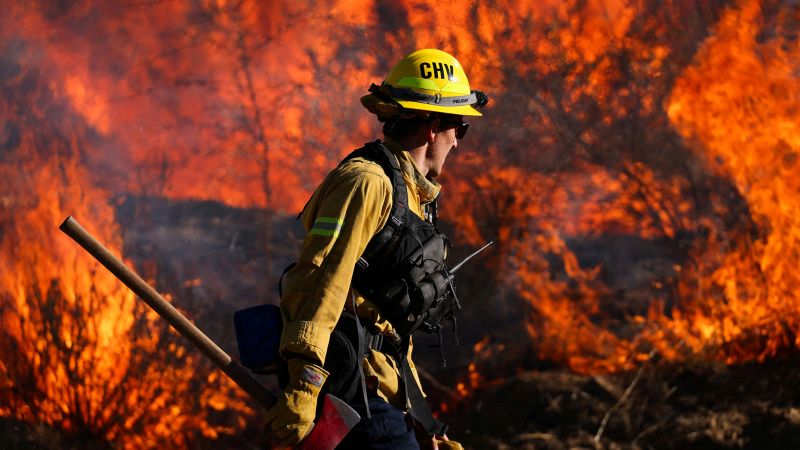The threshold that the world's scientists determined as safe
I'm reopening this market and extending the close date. While the close date is mid-2030, the years in question are 2023-2029; this is to account for reporting delay. I can't edit the description, unfortunately, so this comment will serve as the new resolution criteria. This market will resolve Yes early if any year before 2030 passes the 1.50C mark, as rounded to 2 decimal points and displayed on the chart.
Data source will be the GISTEMP data, Global Annual Mean Surface Air Temperature Change, currently found here and on related pages. This is the source for the OWID chart. (OWID chart for reference only, GISTEMP is authoritative if they disagree.)
If GISTEMP data ceases to be available we'll do our best to find an alternate source that matches it as closely as possible.
@EvanDaniel Which base period? 1.5 degrees usually means relative to preindustrial temperatures, but GISTEMP seems to only give numbers relative to 1951-1980.
@StevenK Here's one attempt to align GISTEMP with longer time series, but I don't know if it can be used as a resolution source, among other reasons because they may not make similar graphs for future years. https://berkeley-earth-wp-offload.storage.googleapis.com/wp-content/uploads/2025/01/03231042/GroupCompareEarlyBase.png
What would people think about using this OWID data or its underlying gistemp source?
"Average annual temperature by 2030" sounds to me like we're talking about an average for a single calendar year, with any year 2023-2029 (inclusive) counting, with early resolution if/when one of those years exceeds 1.5C.
@traders I think it would be good to clarify this as moderator and re-open for continued trading; it's an interesting and important question, with a bunch of activity.
Would anyone like to suggest a specific resolution source / methodology? I think there are probably several good options, and I'm hoping that they're close enough it doesn't make much difference to trades so far which one we pick.
Please speak up with both suggestions and objections to this plan!
@makeworld It already closed on Oct 16th. I did not close it, that was the default close date. I figured I'd ask for comments before making any changes, including reopening.
@EvanDaniel Here is my suggestion
Select a resolution source (e.g. "temperature as reported on x site compared to x baseline"
Set close date to 2030
I wouldn't N/A simply because it is likely that many people who make markets resolving in 2030 will eventually quit before they resolve. We need a proper system to continue those bets to their ends, to not punish long term traders.
EDIT: if the resolution source leads to a significant shift (+/- 30% that doesn't bounce back for like a month) then we should N/A. This could probably apply to any future markets like this, but shouldn't be an issue here
if the resolution source leads to a significant shift (+/- 30% that doesn't bounce back for like a month) then we should N/A. This could probably apply to any future markets like this, but shouldn't be an issue here
I think we're far enough away from resolution time, and the good sources are in good enough agreement, that we can just pick one and stick to it regardless of outcome. In general there are markets that won't work for but I don't think this is one of them. If anyone disagrees about this market, I definitely want to hear about it!
@AnnaBAlbright It seems like this needs some clarification and an extension of the close date if it's going to be a good market. Can you offer some assistance? Should we resolve this N/A?
Average annual temperature of Earth is about 15°C https://en.m.wikipedia.org/wiki/Global_surface_temperature - I suggest you rephrase or clarify the question.
Does this resolve yes if a single year has a higher global average temperature than the 1.5C above preindustrial?
Which preindustrial reconstruction will be used?
Which temperature dataset will be used?
Or does an average of several years have to pass the 1.5C? How many years are in such an average? 30 would be normal but that would make this difficult to happen.
I say YES. According to studies, we will most likely witness the warmest year ever registered within the next 5 years (estimated probability 98%), with the annual average temperature soaring over 1.5°C. That certifies that the current climate situation is critical. However, If we consider the Paris Agreement’s 5-year average, I think the odd are still in our favor (not for long though). Data show that there is a 30%ish probability that we will exceed the 1.5C threshold. That shouldn’t makes us feel better since this estimation was only 10% between 2017 - 2021!
There is a very high possibility that the global average temperature will be higher than 1.5 degrees Celsius. Based on a rough observation of the graph, it can be seen that every decade the average temperature has increased and broken records. From 2001 to 2010 the temperature was 0.56 degrees Celsius, but from 2011 to 2020 it increased as high as 0.99 degrees Celsius.
Moreover, a new update issued by the World Meteorological Organization (WMO) reports that there is a 66% chance that average temperatures will exceed 1.5 degrees Celsius before 2027 and a 98% chance that at least one year will be the warmest on record.

